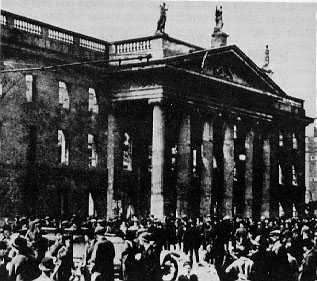On the twenty year anniversary on the of the Easter Rising of 1916, Pat Devine wrote a piece detailing the events of that now infamous day in the April, 1936 issue of The Labour Monthly. The article included the declaration from the Irish Republican Army (IRA) for the independence of Ireland. What followed was a week of bloodshed as the small group went to war with English officers in the hopes of gaining freedom for their homeland. Finally on April 29, 1916 the band surrendered, and according to Devine’s article, there were a total of 1,306 casualties (229). This obviously caused outrage in the minds of those who thought like those members of the IRA, who would lay down their lives against oppressive imperialist forces.
This topic was also one that was very prevalent in the mind of poet and nationalist W.B. Yeats who was constantly calling for those of his country to resist the Anglicising of Ireland. In His poem “Easter, 1916” Yeats talks of that very day. As it was first written in September of 1916 Yeats uses the poem as a political conversation piece to bring to light what had happened that spring. He opens the poem with talk if the modern day, passing on the nameless faces on the street, only to then mirror that with the brave images of the ones who woke up and did something. He was, in a sense, urging those nameless faces to wake up from their grey state and realize what was happening around them.
It makes sense that something of this nature would appear in the pages of Labour Monthly
. The magazine seems to be for those who are cut from the same cloth as members of an organization like the IRA. It just goes to show that even twenty years later, the same political thoughts still burned in the minds of western readers.


This is a solid archival effort, but I’m wondering why you didn’t choose a news item from the years surrounding 1916, or another response to the uprising. It seems a bit roundabout to go to a 1936 source to contextualize what happened 20 years earlier (the retrospective nature of the later article makes it seem more like a retrospective post).